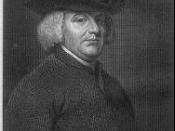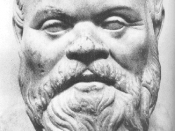A Free Will Theodicy
by
Paul Ward
Philosophy of Religion
Professor Horst, Steve
To truly understand this free will theodicy we must first try to understand the problem of evil by itself. I feel that the simplest and yet most complete understanding of this was best written by C. S. Lewis. He explains this problem by writing, "If God were good, He would wish to make His creatures perfectly happy, and if God were almighty, He would be able to do what He wished. But the creatures are not happy. Therefore God lacks either goodness, or power, or both." (Nicholi 2002)I would simply add to his final conclusions that God lacks goodness, power, both or He simple does not exist. It seems that as time goes y this argument is being more often to attempt to prove that God does not exist, specifically the Christian God. This argument is not new to our scientific and skeptical age.
This is a question that has been posed by a myriad of Philosophers throughout most of history. The biggest problem with this argument is that it's a good argument. It has withstood the trials over time and still convinces many today. This argument tries to get one to admit that either God is not all loving, all knowing or all powerful and then, by definition of the Christian God, there is no God. (White 1996)
I believe that this problem has become more widespread in the past century. I believe this for two main reasons. The first is that I am convinced that with the rise of the ability and the power of the media more information get out quicker and we have less time to discern anything in it. We hear this question being raised in article, on television and in...


